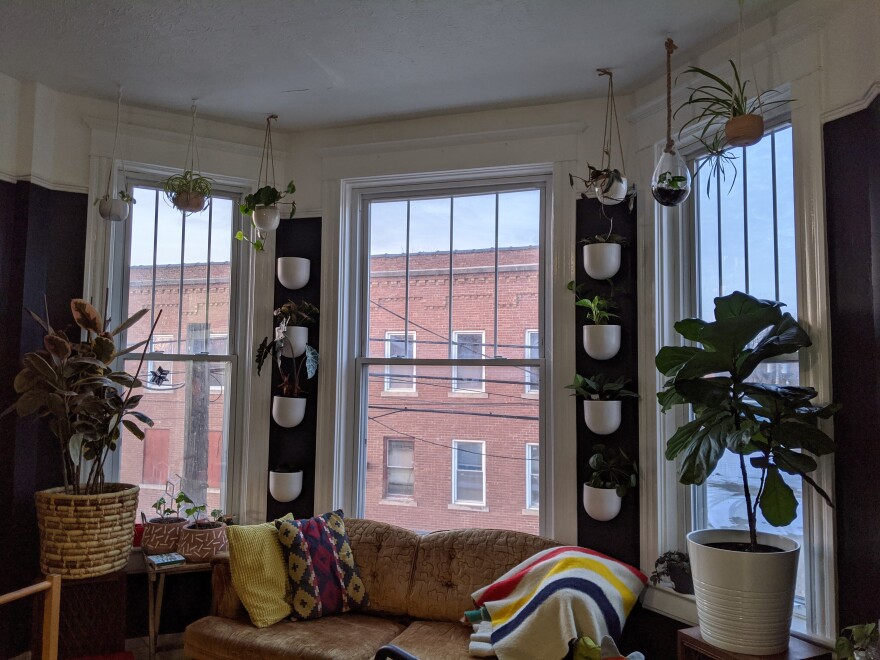You've heard of "dog moms." Now get ready for "plant parents."
More people are discovering their green thumb, as interior design and social media trends expose people to beautiful flora in all shapes and sizes.
House plant enthusiasts say it's about more than aesthetics: plants provide their own form of companionship.
What started with an enticing photo on Facebook has evolved into an obsession for Elizabeth Feathers, who bought her first houseplants at the beginning of COVID-19 lockdown.

"I started with three. Now, I think I have about 50 plants," Feathers said. "I'm kind of a plant sherpa for some of my friends, just getting them started with plants. It's such a piece of my identity now, I can't believe it's only been a year."
Feathers said some plants are trickier than others, but she's pleased with her success ratio. She's only lost five or six plants so far—which she knows because she keeps a detailed spreadsheet of her "plant babies."
“I have a rex begonia. That was my first kind of tricky plant," Feathers said. "Rex has done very, very well. He's died a few times. We did move, so he struggled with his new positioning. But he comes back every time.”
Feathers is far from alone in a her zeal for houseplants.
John Fegan, head of the houseplant department at Casey's Garden Shop in Bloomington, said he's met a lot of people picking up their first plants. They often become regulars.
"I kid you not, I have customers who live nearby and they will come in when I have a truck on the side of Main Street because they'll say, 'Oh my gosh, I know you got a new shipment and I want to be the first to have dibs," Fegan said. "I feel like we're selling Pokemon cards to 10-year-olds.”
Fegan said the industry hasn't seen this big of boom in decades. He said house plants were big in the '70s and '80s. Interest fell off for a while, but Fegan said the internet has revived the craze.
"I think that people are just rediscovering what a lot of horticulturists and botanists have known forever," he said. "There are a lot of people who have kind of, I think, due to social media seen a lot of new houseplants species that they didn't even know existed—colors and shapes and textures and sizes of plants that are just absolutely wild.”

With access to more species of plants than ever before, Fegan said it's easy to develop a collector's mentality.
That's what happened for Tahnee Lathrop. She remembers helping her mother water plants as a kid. But when she got her first plants as an adult, she accidentally killed one by keeping it in the hallway, too far from the window. Since then, she's developed quite the green thumb.
“I think the last time I counted it was around 60 plants," Lathrop said. "It’s really taken off. And I’ve probably gotten a few more plants since I last counted."
Lathrop even sells houseplants at her store, Retrofit Culture. She said people love to talk about their plants. That's why she started the Facebook group, "B/N Plant Parents (Houseplant Lovers of Bloomington-Normal)." It's grown to nearly 700 members.
People exchange information on which shops got a new shipment, diagnose browning or droopy leaves , and share photos of coveted new plant growth.
“Things that not everyone in your life might care about," Lathrop said. "But then people in the plant group are like, 'That's amazing?' and you’re, 'It is! That's how I feel too.'"
Lathrop said plants are about more than just looks. They breathe life into a home and give "plant parents" a sense of purpose.
“I think we maybe instinctively know that house plants are good for us and taking care of things is good for us—for our mental health," Lathrop said. "You just kind of know … this makes me feel good, planting my fingers in the dirt and watching it grow and taking care of something. Even if you’re at your house alone, I feel like it doesn’t feel as lonely with plants.”
Plant Parent Mickenzie Lockwood said some use plants as a mood booster—or even a pandemic coping mechanism.

“It's like a healthy hobby that isn't horribly expensive, depending on what you're buying," Lockwood said. "It brings me a lot of joy.”
She said she ran out of room for plants in her home, but that didn't stop her from adding one more: a eucalyptus tree.
Lockwood uses some her plants, like aloe vera and lavender, to create soothing lotions and infused oils to help her de-stress, and said just knowing that her plants need her helps pull her out of emotional funks.
“It gives me something to take care of and just occupy some time," she said. "It gives me something to do and something to look forward to every day.”
Elizabeth Feathers—whose collection grew from three to 50 plants during the pandemic—said when she was struggling during the stressful early days of COVID, her plants struggled, too.
“I felt really bad that I couldn't keep up with them. I didn't lose any, I'm so grateful. I was able to do pretty much the very, very bare minimum when I was having a hard time," she said. "I remember I talked to my plants a lot. I made sure to give them positive messages and tell them how well they're doing and that I'm proud. I remember thanking them (and saying) like, 'I'm so sorry, I wasn't here for you.'"
Feathers said it's a lesson in patience and resilience that translates to people, too.


